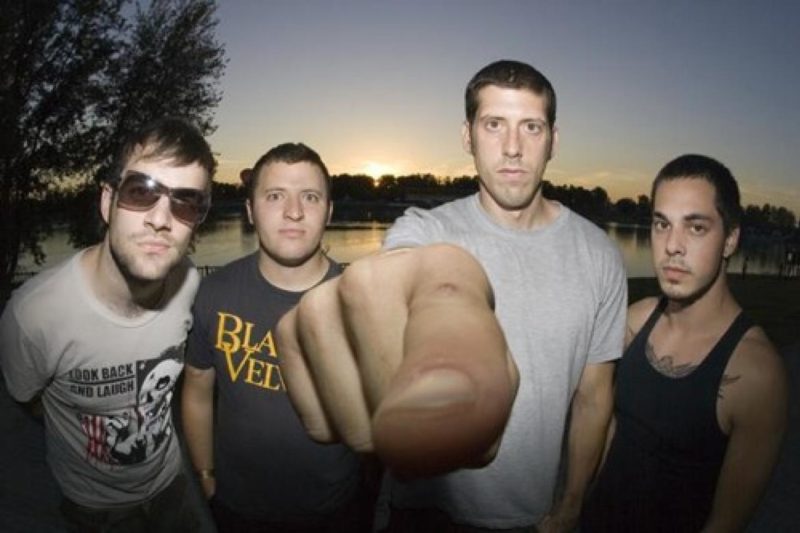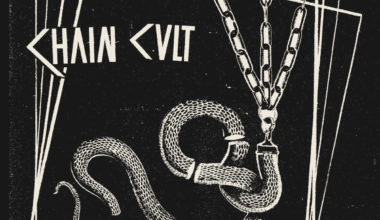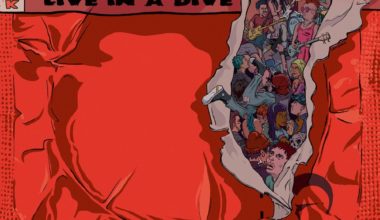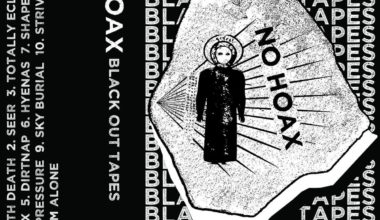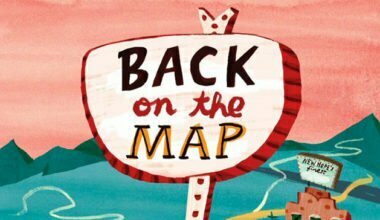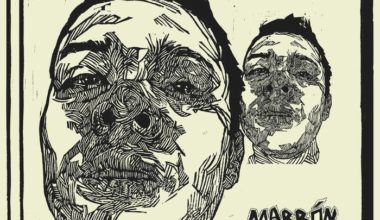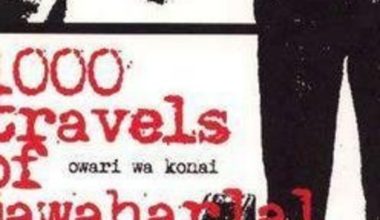Four Simple Steps To Total Life Satisfaction Paint It Black – Munich, June 14th 2005
Interview with Dan Yemin, singer and mastermind of Lifetime-fame-
I haven’t been to a Hardcore-Show for quite a while now. I dropped out of the ’scene‘ for several different reasons: first of all, I simply became attracted to other kinds of music while at the same time I got bored of Hardcore-Bands sounding the same and screaming the same phrases over and over again. Then I was honestly sick of the dogmatic rules of the Hardcore/Punk-Scene. But I still listened to my old records and I still kept up to certain punk/HC values and ideals like vegetarianism. So when I heard that Paint It Black from Philadelphia were the new band of former Lifetime-member Dan Yemin I got interested in it somehow. Surely because Lifetime are still one of my favourite bands. And of course you wanna know what your old hardcore-heroes are doing nowadays. Paint It Black are Dan Yemin (vocals/guitar), Andy Nelson (bass), Colin McGinniss (guitar) and David Wagenschutz (drums). They released 2 records so far: CVA in 2003 and Paradise in 2005.
So we decided to watch their show in Munich on June 14th at a club called Backstage. Spontaneously we did an interview with Dan, though we hadn?t prepared anything. So why not talk about things every ageing punkrocker is concerned with…
rm: I?m 28, how old are you?
d: Older than that, more than 30.
rm: Are you a doctor of psychology?
d: Yes.
rm: I’m about to finish my study in a couple of months, so then I’ll have to work on a regular basis. But I still want to apply my punk/HC ideals to my everyday life then. How do you manage to do that?
d: Applying my ideals to my work?
rm: You know, if you’re 16, it’s easy to be in a scene and to promote certain ideals and values. But if you have to earn your living, you have to compromise in a way.
d: Sure, I compromise in certain ways. That?s a difficult question… I have to work, I own a house, I have to pay a mortgage every month, but I have my own career. You know one of the things is independence: I work for myself, I studied for a long time to put myself into a position where I can work for myself, to be free to do music as much as possible. I mean there are certain things that aren’t so hard to integrate into adult life: I’ve been vegan for 14 years, and that just stays the same, no matter what. It gets easier, because I have more money to buy food. When I was in school, it was just noodles and frozen peas and shit like that. But I think one thing about being independent is to be able to structure my work the way I want to and also the kind of work I do. I had to make some compromises. I used to work in public health clinics in the city in pretty disadvantaged neighbourhoods. But I couldn’t make a decent living doing that, so I moved into what we call in the States a private practice, where I share office space with a bunch of other psychologists. We make connections in the community and see people that can pay for services. I think that’s the thing that troubles me the most, because in some ways that has been like selling out, like I?m not doing work that is charitable.
rm: A lot of people finish their study, and all of a sudden, everything that they were believing in throughout the last ten years is lost.
d: I had to make compromises in the work I do in order to make a living, to pay for my student loans or to be able to have a home. I have a certain number of spaces in my schedule that I have reserved for people that don’t have enough money, so I can do a certain amount of my work at a reduced fee, so I can help students and punks and people that don?t have the money for psychological services and that don’t have insurance. Focussing more on my home, bying a home and fixing the home up, painting it and that sort of thing leaves less time for activist kind of stuff, less time for everything, less time for songwriting, less time for going to shows.
rm: But you can live your life in an alternative way and still have a family and own a house.
d: My girlfriend is a punk also and she’s in medical school. We’re both dedicated to living outside the norm/norms. Obviously we live in an industrial capitalist society, but we’re both very critical of the trappings of that sort of success. We talk a lot about how we’re going to live our adult lives and raise children in a way that it’s not necessarily mainstream, that it challenges the cultural standards of our society. I have punkrock friends that have kids already. I mean I can’t go to shows as much as I used to do, but on the other hand, because I work for myself, sometimes I can still go to shows 2 or 3 times a week. But it’s a lot of time to be in 2 bands and do a lot of other stuff like that. A lot of my other friends are still musicians and punks.
rm: How did the importance of music change for you, compared to when you were 16 and now?
d: Music is more important now than it ever was. For me it provides such a balance for my regular ’normal‘ adult life. It’s an entirely different outlet and I get an entirely different energy from it. I’m lucky enough to have two big things in my life, that both give me a lot of positive energy: at work I get so much energy from the people I work with and from the power of how resilient they are. The human ability to be resilient is amazing to me. I get to see it in such extrem forms everyday. How people can rise above such terrible circumstances, especially how flexible and resilient children are. I work with a lot of teenagers. And the energy I get from music is pure release and excitement. It makes me feel like half my age again. It makes me feel 16 again when we play.
rm: Listening to your old records from Lifetime and Kid Dynamite, I thought that usually people start playing softer music when they become older. But somehow the bands you’re playing in are becoming more and more aggressive.
d: Yes, it’s been the exact opposite for me. Lifetime was a lot of fun and I don’t think that I’ll ever have the opportunity to work with such a capable and talented group of people again. That combination of people for songwriting was just amazing. But after a while I felt like doing songs that were just about broken hearts and relationships. It’s not that this is not important, but it’s limited. And I felt like I was missing out on adressing a lot of important things and expressing a lot of important things. And that’s why I took a lot more control when I was putting Kid Dynamite together. But I wanted that to still be melodic. But even then I wrote all the music for Kid Dynamite, but I didn’t really have much saying on the lyrical topics. No disrespect to Jason, but after the first record the music started to be more about relationships and less about politics again. That?s ok, but I have a lot that I wanted to express politically in a way that I didn’t think people were really expressing very effectively in hardcore. A lot of politics in hardcore is just slogans and pretty childish. And when I was writing the music for Paint It Black, I started thinking about how long it would take to find somebody that I really trusted to express the kind of things I wanted to express. I kinda felt like it was incomplete now for me to write the music and then hand it to somebody else to do the words. I know I can’t sing, but I know I can scream. So I just figured out to do it myself. Because I would end up being a 35-year-old guy – oh shit, I just admitted it – writing the songs with a 22-year-old kid writing the lyrics. And that doesn’t do it for me anymore. No disrespect to younger kids, but I wanted to express things at a level of sophistication. And I think on the first album I failed at that. I think there are some moments on the first record, on CVA, where I achieved what I wanted to achieve. Where I feel like it’s insightful and intelligent and expressed in a different way. And then there are moments that are very simplistic and heavy-handed, not subtle at all, and that I’m a little embarrassed of at this point. But I think on the second record I really got across a 100% of what I was trying to get across. I figured out how to write lyrics that I can be really proud of, that I don’t look back two months or six months later and I’m embarrassed of.
rm: I read through the lyrics last week…
d: For the new record?
rm: Yeah, for the new record and a few lyrics stuck out for me: The New Brutality and Labour Day.
d: The New Brutality: That song is really about the everchanging nature of state control and social control. The idea came first from Michel Foucault in Discipline and Punish. I won’t pretend I’m a fucking genius, I mean it took me a year to read that book, it’s a very difficult book. The point is that the state used to control their populations directly and very obviously, by the means of force, public punishment, execution or imprisonment. Now I think we’re controlled in much more subtle and insidious ways. In many ways we are controlled in ways that we’re not even aware of. And a lot of it is just the fact, that any sort of presentation of news in the media is by its very nature propaganda. Because whoever does the editing, whoever decides what is shown and what isn’t shown, its already an act of propaganda just by the very nature of how it happens and how we’re exposed to it. Whoever wheels the power, especially the power of the media, has the power to define the parameters of public discourse. Sometimes there’ll be a debate on a certain issue and I listen to that and the real issue isn’t even in that. Nobody is allowing that point of view into the public discourse. In the context of being really provoked by Foucault’s writing and then seeing the way how the American public was manipulated into supporting this war overseas that we’re involved in right now. Well that’s the American government involved in that, not me. People are supporting this war because they believe things to be true that are just not true. There was some research on the people that were supporting George Bush in the last election. People still believed all the things that has been disproven even in the public and mainstream media. People still believe that we have proof that Saddam Hussein was connected to Al-Quaida. People still believe that we have proof that Saddam Hussein has weapons of mass destruction. Even when all these things have been disproven in the media numerous times, the people supporting him were clinging to a reality that just was not reality. It’s an entirely fabricated reality.
rm: That was basically what I thought the song was about.
d: I’m glad you say this. I’m glad you could tell what this song was about. I read a review of the record and he talked about this song and said this song was about fighting back against the police… that’s not what it’s about. I get disappointed when people miss the point.
rm: Was it a German review?
d: No, someone in the States.
rm: Sometimes the language barrier can be a problem.
d: If English is not their first language, I don’t get upset when people misunderstand, but when Americans misunderstand… Fuck, how hard do I have to try. That’s the song I’m most proud of on the record. My favourite reference in that song is that I use a piece of – I don’t know if you follow Hiphop at all – a Nas lyric from Illmatic: I lie down with one eye open now – ‚cause sleep is the cousin of death.
rm: I listened to it and somehow it was a catchy phrase, but I didn’t realize that I knew it…
d: It?s from the first song N.Y. State Of Mind on Illmatic: I never sleep, ‚cause sleep is the cousin of death. The other thing I’m really proud of is that there are a lot of lyrical references in this record: David Bowie, Joan Baez, Wu-Tang Clan, Nas. And they might be just my little secrets, but I assume people picked up certain ones. Paradise is Joni Mitchell or Joan Baez ? I’m a little drunk ? anyway, it’s Joni Mitchell.
rm: And what does CVA mean?
d: CVA means cerebral vascular accident ? it’s a medical term for a stroke. I had a stroke and that’s what made me come back to music. Kid Dynamite had been broken up for a couple of years and I was just working, devoting all my time to my career and then I got very sick and I was in a hospital. I reevaluated my life priorities and immediately as I got out of hospital I started this band. That’s why it’s called that.
rm: I dropped out of the hardcore-scene in 1997/98, though I still like the music and some of it’s values. But in general the punk/hardcore-scene seems very conservative to me.
d: They’re very conservative. If you go far enough left, then you meet the right. It’s circular like that.
rm: But do you have to get older to realize this?
d: Yeah I think so. I think a lot of that shit is part of normal adolescent behaviour. Desperately searching for identity and using any sort of code you can grab on to create identity and difference and belonging. With defining where you belong you are also defining from whom you are differentiating yourself from. As a psychologist I know that it’s normal adolescent behaviour. But at least in wealthy industrialized nations adolescence lasts well into your twenties, because we go to university and our parents are still paying for everything. So at 24 we’re still like 17 and that’s where a lot of that stuff comes from. In my thirties im finding a way that I can forgive it and not really be bothered by it, because my friends are older. My music friends are still doing music and still have their politics intact and are not really concerned with trivial bullshit. But you know I think it’s easier to stay engaged when you’re creating a part of the culture, like if you do a fanzine or a band.
rm: I thought it was too limited, I started looking around what else there was going on.
d: The scene is maybe just a small part of my life, but making music is a huge part of my life. And how I define myself politically and culturally is a huge part of my life. But those things are connected historically to my punkrock roots, but they’re not limited to that. My community of people is not defined by a punk scene. Although a lot of my close friends are grown up punks, they do a lot of different things from politics to education to writing for music magazines, you know, all sorts of stuff. One of my friends whom I?m in my other band with, he runs a music magazine. I review all the Hiphop for the magazine. That’s still totally close to music. People are doctors and social workers and teachers. I have a bunch of friends who are teachers. The reason they became teachers is because they have the summer off and they skate all summer. They go on road trips. They go to Australia and New Zealand for a month and skate all the skateparks there. And it’s also an important way to influence children, but also to have 2 months off a year is fucking great!!
rm: In Germany it’s more than 2 months.
d: Awesome!
rm: A lot of the people at my university study or work as a teacher just because of the holidays. That’s an important part of it, but I can’t imagine myself doing this for 40 years just for the sake of the holidays.
d: No, that’s not enough. My friends do love teaching also, they love kids. But the other thing I wanted to say about integrating my punk-politics into my work is that I work with mostly teenage boys. And part of my implicit agenda is to challenge their understanding of masculinity and what it is to be a man. First by setting an example, but also by challenging their assumptions of what it is to be constricted in your expression of emotion, to be hard, to be not vulnerable. There?s some stuff on the first record about that too. But that?s also part of my agenda in my work, ‚cause I don’t tell that to them or their parents, like ‚oh I’m gonna be challenging your son?s definitions of masculinity??, but it?s implicit in every part of my work. And I see that as political work openly.
rm: You played in Lifetime 10 years ago and now you said that you grew out of the scene somehow. Is it sometimes frustrating?
d: I tell you what’s frustrating and I almost don’t wanna admit this, but I’m gonna admit it because I wanna be honest. I am saddened and sometimes disgusted by the bands that get really popular. With only a few exceptions, the bands that are really big right now in hardcore I have no understanding of why people like them. I’m not gonna name bands. I can tell you bands I do like, but I won’t say it on tape.
(So we turned the taperecorder off for a moment.)
d: I look at it like someone who has his own business. I get frustrated because I feel like I’m bringing a superior product to the salescounter and people are bying products right next to us that are really cheaply made and almost falling apart and people are choosing that product over the product that I like. I get frustrated because I don’t think much hardcore today is good, but there a lot of bands that are really popular and I feel like they eclipse us. People have shown me copies of the promotional budget for a record on one of the big hardcore labels and people have like $ 50,000 advertising budgets on independent labels. I think that has a lot to do with it. When you put something in people’s face over and over again, when you have a full-page colour ad in a huge magazine every month for 6 months. We get really good press, but it comes and then it’s gone. We get really excellent reviews and really good interviews, but it all comes out the month the record’s out and then there’s nothing.
rm: But is hardcore in the States that big?
d: Yeah.
rm: So do you play big shows?
d: We do well. We also don’t tour a lot, which is the nature with our jobs and everything. We can’t tour a lot. This tour is twenty days and it’s the longest tour we’ve ever done. Usually we fly to the west coast and play for ten days in California. We can do Boston to DC on weekends. We’ve toured in the Midwest for a week at a time like three different times. So that’s part of it too. We can’t be out on the road for 6 months out of the year. Bands just have these huge budgets now for promotion and it’s insane. I guess part of me is jealous of that, to be honest. I just don?t wanna be a hater… I get frustrated because we work really hard and I think we make – this is gonna sound arrogant – but I think we make really excellent punkrock music and I think it?s intelligent. Bands still singing about being stabbed in the back and shit. At this point it’s ridiculous. Bands singing about revenge and being stabbed in the back – give me a fucking break! There’s this certain element in current hardcore that’s very misogynistic, which I’m disturbed by. There’s this whole aesthetic of bands in the US where their t-shirts and their album art is kind of like: ‚you broke my heart and now you gonna end up dead in the trunk of my car.‘ You know like pictures of a dead women lying in the trunk of a car with blood trickling out of her and it says: ’she had it coming‘ or something like that or ‚heartbreaker‘ underneath. There’s a very violent misogynistic imagery. Are you fucking joking now? Everybody gets the heart broken. It’s not anybody’s fault. All relationships either end in heartbreak or marriage – sometimes both. Don’t be so fucking arrogant to think you’re so special that you’ve had your heart broken.
rm: Are these bands serious about that?
d: I don’t know if they are serious or not, but it’s dangerous to have that kind of imagery in your music. It already reinforces this kind of insulated-boys-club-mentality in hardcore that’s already there. Anyway…
rm: I?ve never been into such stuff, so…
d: No, they’re not bands I?m into. It’s just that I see it, you know. Anyway, any more questions?
rm: Let’s talk some more about the lyrics. What about Labour Day?
d: Labour Day was written for a friend of our’s that used to tour as a roadie for bands and as a tourmanager and stagemanager for bands that would tour full-time. He is a musician himself and he was kinda struggling with wanting to not be on tour 8 months of the year. Especially if it wasn’t for his own music. He was just helping other people make their music. He was away from his wife and he was away from his own friends and his own music. It?s really easy money, when you work for other bands, big bands. You get paid like 700$ a week to tune the guitars and stuff like that and it’s hard to walk away from that. And my friend was struggling with the idea of quitting that life, to be at home and work a regular job on construction and work on his own band. The beginning of the song is for him. And the end of it is kind of this analysis of… again this kind of half-baked critique of industrial capitalism and the whole cycle of earn to spend, earn to consume. You know just keeping the economy rolling to the cycle of earning just enough to spend on products and put yourself in debt, so you have to work harder, because you want all these things. You want all these material things, that are somehow gonna satisfy you and fill the hole in your life that’s left by the whole alienation of work in the first place.
rm: On the one hand you have to do it, but you don’t wanna be just a consumer, just a product.
d: A lot of times work can be very alienating depending on the work you do. And the emptyness that’s created by that, we fill with material products. And to get that material product, we have to work harder to have the money to buy the things we can’t really afford, to buy the things to fill the hole created by the work that we do. So when I talk about: ‚Hats off! to the slash-and-burn architects/they know exactly where despair and commerce intersect‘, that’s like my short critique of that cycle.
The taperecording ended at this point of our conversation. To be honest, there was and still is so much more to talk about. But nevertheless, Dan has been a very open-minded and inspiring interview partner. Later that evening, Paint It Black played a really great gig in front of a totally reserved (arrogant? lame!) audience, that prefered to stand in the back instead of participating and having some fun.
